EDU102 Introduction to Pedagogy Midterm Exam: Problem Solutions
VerifiedAdded on 2022/09/26
|5
|1391
|174
Homework Assignment
AI Summary
This assignment provides solutions to pedagogical challenges faced by teachers, addressing issues of teacher personalities, student engagement, and classroom management. The student explores how to handle reserved teachers, address student issues such as lack of breakfast and distractions, and manage disinterested students. The assignment also covers revisiting lessons, thoughtful planning, and the importance of adapting teaching methods to improve student outcomes. The student uses in-text citations and a works cited section in MLA style, drawing on various sources to support their answers. The solutions offered emphasize the importance of teacher-student relationships, creating engaging lessons, and addressing student needs to foster a positive learning environment. The assignment is structured to provide practical advice for teachers to improve their effectiveness and create a more supportive classroom experience.
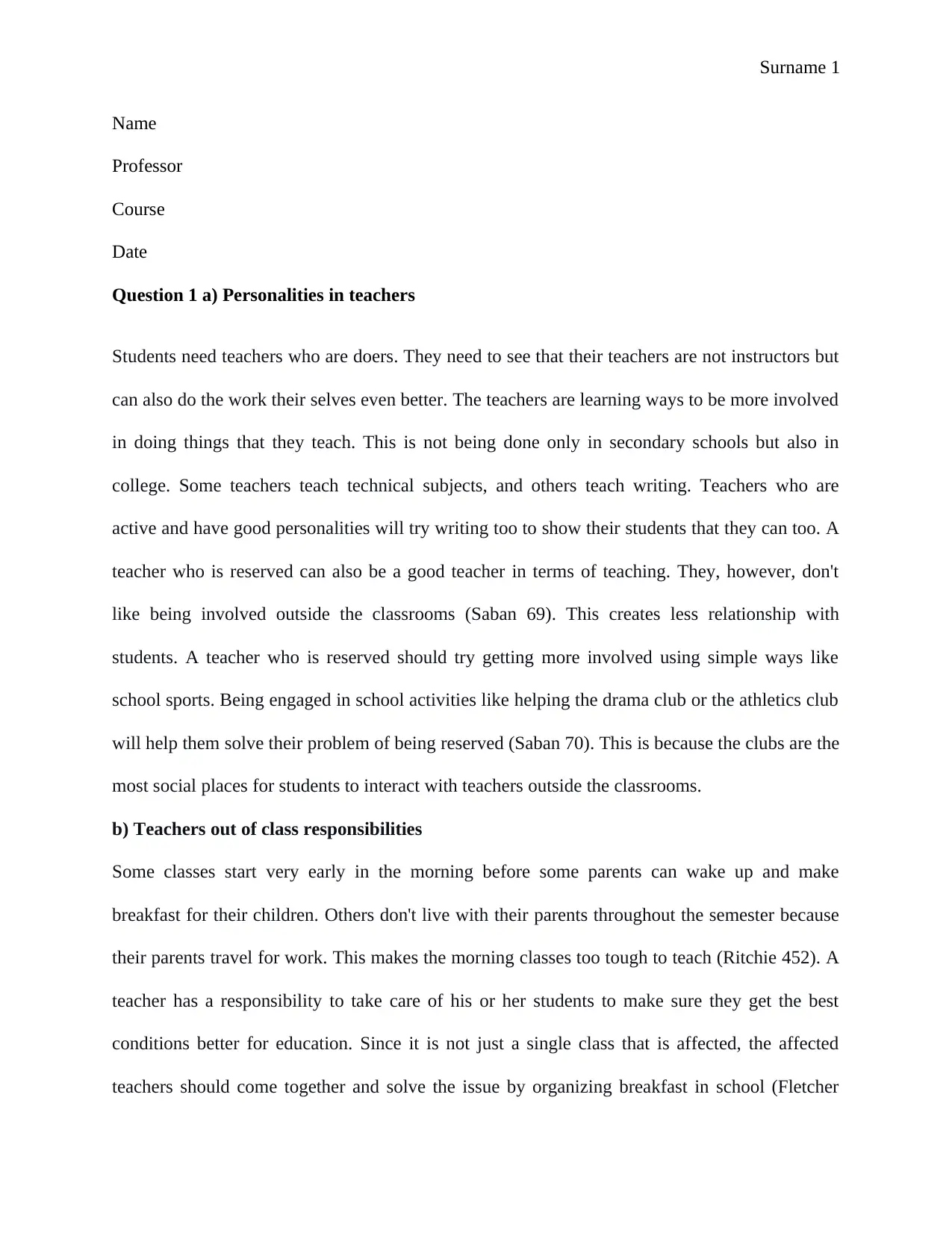
Surname 1
Name
Professor
Course
Date
Question 1 a) Personalities in teachers
Students need teachers who are doers. They need to see that their teachers are not instructors but
can also do the work their selves even better. The teachers are learning ways to be more involved
in doing things that they teach. This is not being done only in secondary schools but also in
college. Some teachers teach technical subjects, and others teach writing. Teachers who are
active and have good personalities will try writing too to show their students that they can too. A
teacher who is reserved can also be a good teacher in terms of teaching. They, however, don't
like being involved outside the classrooms (Saban 69). This creates less relationship with
students. A teacher who is reserved should try getting more involved using simple ways like
school sports. Being engaged in school activities like helping the drama club or the athletics club
will help them solve their problem of being reserved (Saban 70). This is because the clubs are the
most social places for students to interact with teachers outside the classrooms.
b) Teachers out of class responsibilities
Some classes start very early in the morning before some parents can wake up and make
breakfast for their children. Others don't live with their parents throughout the semester because
their parents travel for work. This makes the morning classes too tough to teach (Ritchie 452). A
teacher has a responsibility to take care of his or her students to make sure they get the best
conditions better for education. Since it is not just a single class that is affected, the affected
teachers should come together and solve the issue by organizing breakfast in school (Fletcher
Name
Professor
Course
Date
Question 1 a) Personalities in teachers
Students need teachers who are doers. They need to see that their teachers are not instructors but
can also do the work their selves even better. The teachers are learning ways to be more involved
in doing things that they teach. This is not being done only in secondary schools but also in
college. Some teachers teach technical subjects, and others teach writing. Teachers who are
active and have good personalities will try writing too to show their students that they can too. A
teacher who is reserved can also be a good teacher in terms of teaching. They, however, don't
like being involved outside the classrooms (Saban 69). This creates less relationship with
students. A teacher who is reserved should try getting more involved using simple ways like
school sports. Being engaged in school activities like helping the drama club or the athletics club
will help them solve their problem of being reserved (Saban 70). This is because the clubs are the
most social places for students to interact with teachers outside the classrooms.
b) Teachers out of class responsibilities
Some classes start very early in the morning before some parents can wake up and make
breakfast for their children. Others don't live with their parents throughout the semester because
their parents travel for work. This makes the morning classes too tough to teach (Ritchie 452). A
teacher has a responsibility to take care of his or her students to make sure they get the best
conditions better for education. Since it is not just a single class that is affected, the affected
teachers should come together and solve the issue by organizing breakfast in school (Fletcher
Paraphrase This Document
Need a fresh take? Get an instant paraphrase of this document with our AI Paraphraser
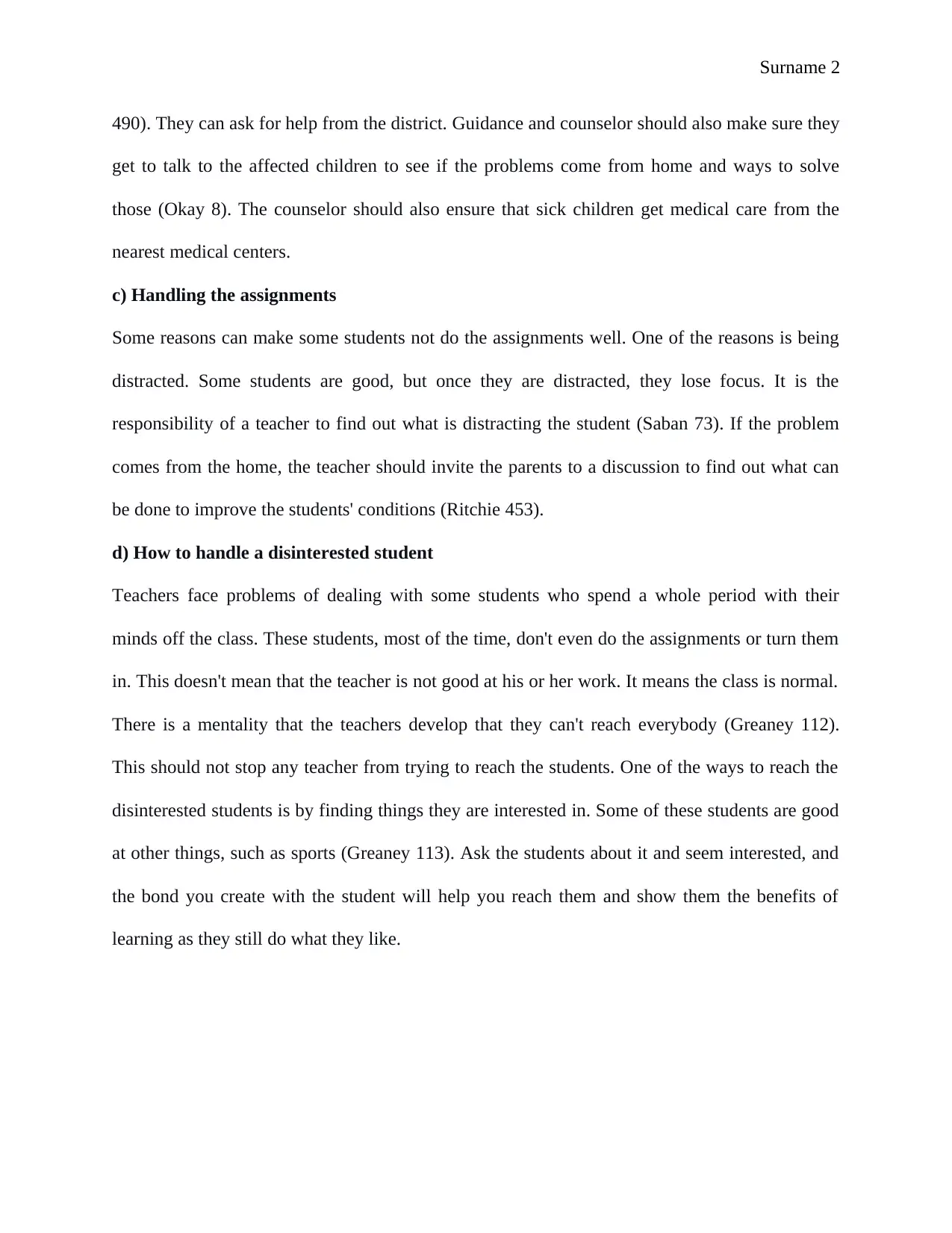
Surname 2
490). They can ask for help from the district. Guidance and counselor should also make sure they
get to talk to the affected children to see if the problems come from home and ways to solve
those (Okay 8). The counselor should also ensure that sick children get medical care from the
nearest medical centers.
c) Handling the assignments
Some reasons can make some students not do the assignments well. One of the reasons is being
distracted. Some students are good, but once they are distracted, they lose focus. It is the
responsibility of a teacher to find out what is distracting the student (Saban 73). If the problem
comes from the home, the teacher should invite the parents to a discussion to find out what can
be done to improve the students' conditions (Ritchie 453).
d) How to handle a disinterested student
Teachers face problems of dealing with some students who spend a whole period with their
minds off the class. These students, most of the time, don't even do the assignments or turn them
in. This doesn't mean that the teacher is not good at his or her work. It means the class is normal.
There is a mentality that the teachers develop that they can't reach everybody (Greaney 112).
This should not stop any teacher from trying to reach the students. One of the ways to reach the
disinterested students is by finding things they are interested in. Some of these students are good
at other things, such as sports (Greaney 113). Ask the students about it and seem interested, and
the bond you create with the student will help you reach them and show them the benefits of
learning as they still do what they like.
490). They can ask for help from the district. Guidance and counselor should also make sure they
get to talk to the affected children to see if the problems come from home and ways to solve
those (Okay 8). The counselor should also ensure that sick children get medical care from the
nearest medical centers.
c) Handling the assignments
Some reasons can make some students not do the assignments well. One of the reasons is being
distracted. Some students are good, but once they are distracted, they lose focus. It is the
responsibility of a teacher to find out what is distracting the student (Saban 73). If the problem
comes from the home, the teacher should invite the parents to a discussion to find out what can
be done to improve the students' conditions (Ritchie 453).
d) How to handle a disinterested student
Teachers face problems of dealing with some students who spend a whole period with their
minds off the class. These students, most of the time, don't even do the assignments or turn them
in. This doesn't mean that the teacher is not good at his or her work. It means the class is normal.
There is a mentality that the teachers develop that they can't reach everybody (Greaney 112).
This should not stop any teacher from trying to reach the students. One of the ways to reach the
disinterested students is by finding things they are interested in. Some of these students are good
at other things, such as sports (Greaney 113). Ask the students about it and seem interested, and
the bond you create with the student will help you reach them and show them the benefits of
learning as they still do what they like.
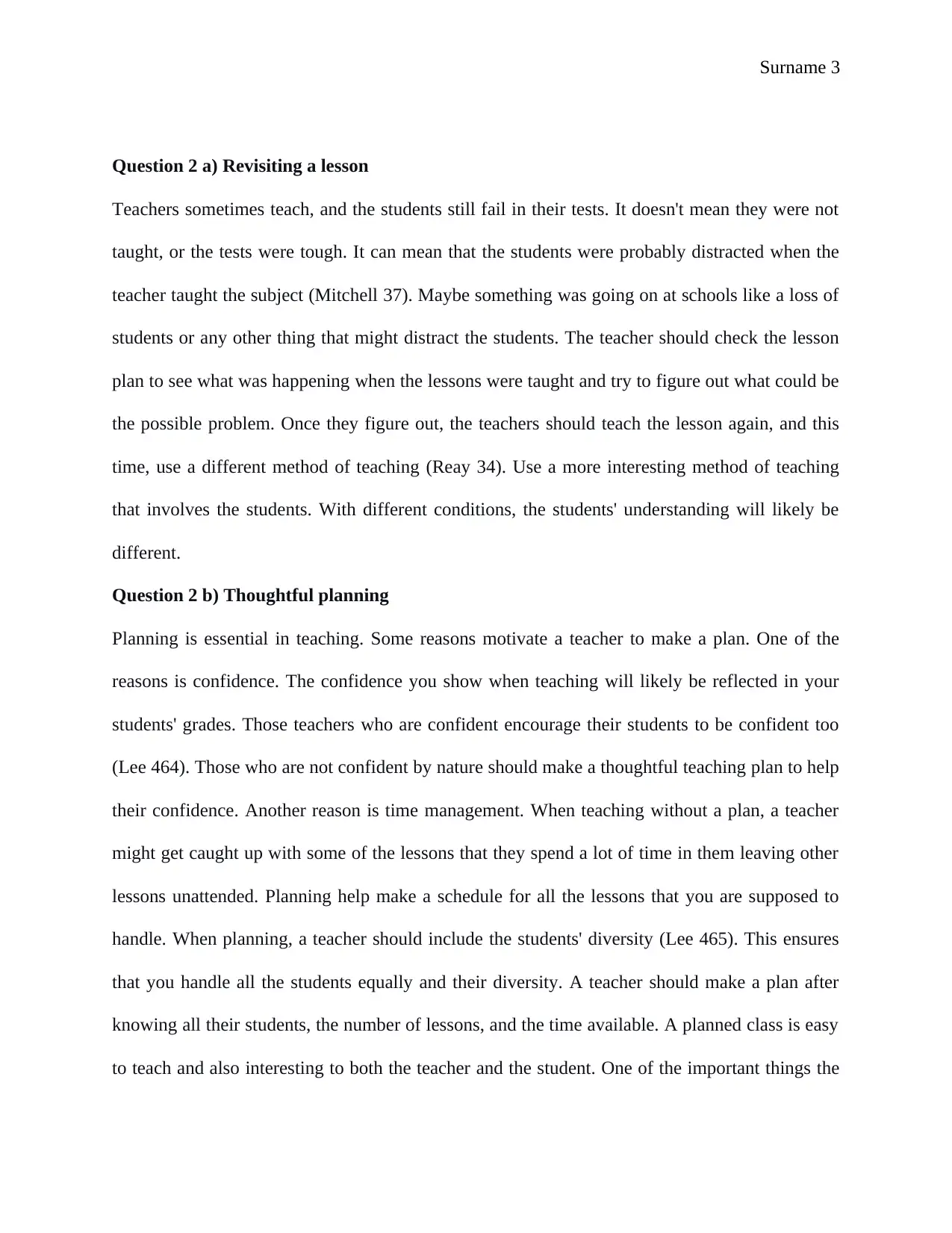
Surname 3
Question 2 a) Revisiting a lesson
Teachers sometimes teach, and the students still fail in their tests. It doesn't mean they were not
taught, or the tests were tough. It can mean that the students were probably distracted when the
teacher taught the subject (Mitchell 37). Maybe something was going on at schools like a loss of
students or any other thing that might distract the students. The teacher should check the lesson
plan to see what was happening when the lessons were taught and try to figure out what could be
the possible problem. Once they figure out, the teachers should teach the lesson again, and this
time, use a different method of teaching (Reay 34). Use a more interesting method of teaching
that involves the students. With different conditions, the students' understanding will likely be
different.
Question 2 b) Thoughtful planning
Planning is essential in teaching. Some reasons motivate a teacher to make a plan. One of the
reasons is confidence. The confidence you show when teaching will likely be reflected in your
students' grades. Those teachers who are confident encourage their students to be confident too
(Lee 464). Those who are not confident by nature should make a thoughtful teaching plan to help
their confidence. Another reason is time management. When teaching without a plan, a teacher
might get caught up with some of the lessons that they spend a lot of time in them leaving other
lessons unattended. Planning help make a schedule for all the lessons that you are supposed to
handle. When planning, a teacher should include the students' diversity (Lee 465). This ensures
that you handle all the students equally and their diversity. A teacher should make a plan after
knowing all their students, the number of lessons, and the time available. A planned class is easy
to teach and also interesting to both the teacher and the student. One of the important things the
Question 2 a) Revisiting a lesson
Teachers sometimes teach, and the students still fail in their tests. It doesn't mean they were not
taught, or the tests were tough. It can mean that the students were probably distracted when the
teacher taught the subject (Mitchell 37). Maybe something was going on at schools like a loss of
students or any other thing that might distract the students. The teacher should check the lesson
plan to see what was happening when the lessons were taught and try to figure out what could be
the possible problem. Once they figure out, the teachers should teach the lesson again, and this
time, use a different method of teaching (Reay 34). Use a more interesting method of teaching
that involves the students. With different conditions, the students' understanding will likely be
different.
Question 2 b) Thoughtful planning
Planning is essential in teaching. Some reasons motivate a teacher to make a plan. One of the
reasons is confidence. The confidence you show when teaching will likely be reflected in your
students' grades. Those teachers who are confident encourage their students to be confident too
(Lee 464). Those who are not confident by nature should make a thoughtful teaching plan to help
their confidence. Another reason is time management. When teaching without a plan, a teacher
might get caught up with some of the lessons that they spend a lot of time in them leaving other
lessons unattended. Planning help make a schedule for all the lessons that you are supposed to
handle. When planning, a teacher should include the students' diversity (Lee 465). This ensures
that you handle all the students equally and their diversity. A teacher should make a plan after
knowing all their students, the number of lessons, and the time available. A planned class is easy
to teach and also interesting to both the teacher and the student. One of the important things the
⊘ This is a preview!⊘
Do you want full access?
Subscribe today to unlock all pages.

Trusted by 1+ million students worldwide
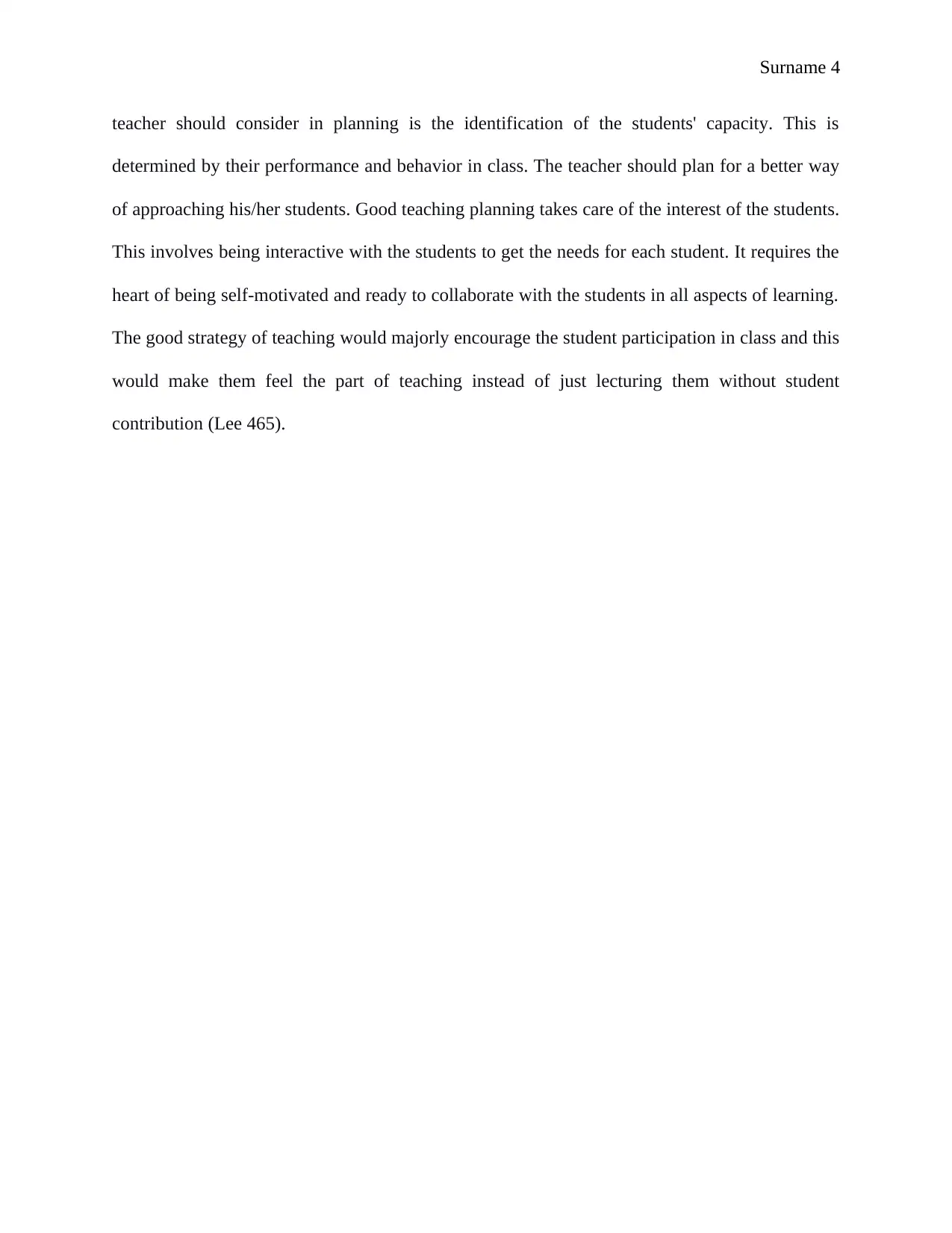
Surname 4
teacher should consider in planning is the identification of the students' capacity. This is
determined by their performance and behavior in class. The teacher should plan for a better way
of approaching his/her students. Good teaching planning takes care of the interest of the students.
This involves being interactive with the students to get the needs for each student. It requires the
heart of being self-motivated and ready to collaborate with the students in all aspects of learning.
The good strategy of teaching would majorly encourage the student participation in class and this
would make them feel the part of teaching instead of just lecturing them without student
contribution (Lee 465).
teacher should consider in planning is the identification of the students' capacity. This is
determined by their performance and behavior in class. The teacher should plan for a better way
of approaching his/her students. Good teaching planning takes care of the interest of the students.
This involves being interactive with the students to get the needs for each student. It requires the
heart of being self-motivated and ready to collaborate with the students in all aspects of learning.
The good strategy of teaching would majorly encourage the student participation in class and this
would make them feel the part of teaching instead of just lecturing them without student
contribution (Lee 465).
Paraphrase This Document
Need a fresh take? Get an instant paraphrase of this document with our AI Paraphraser
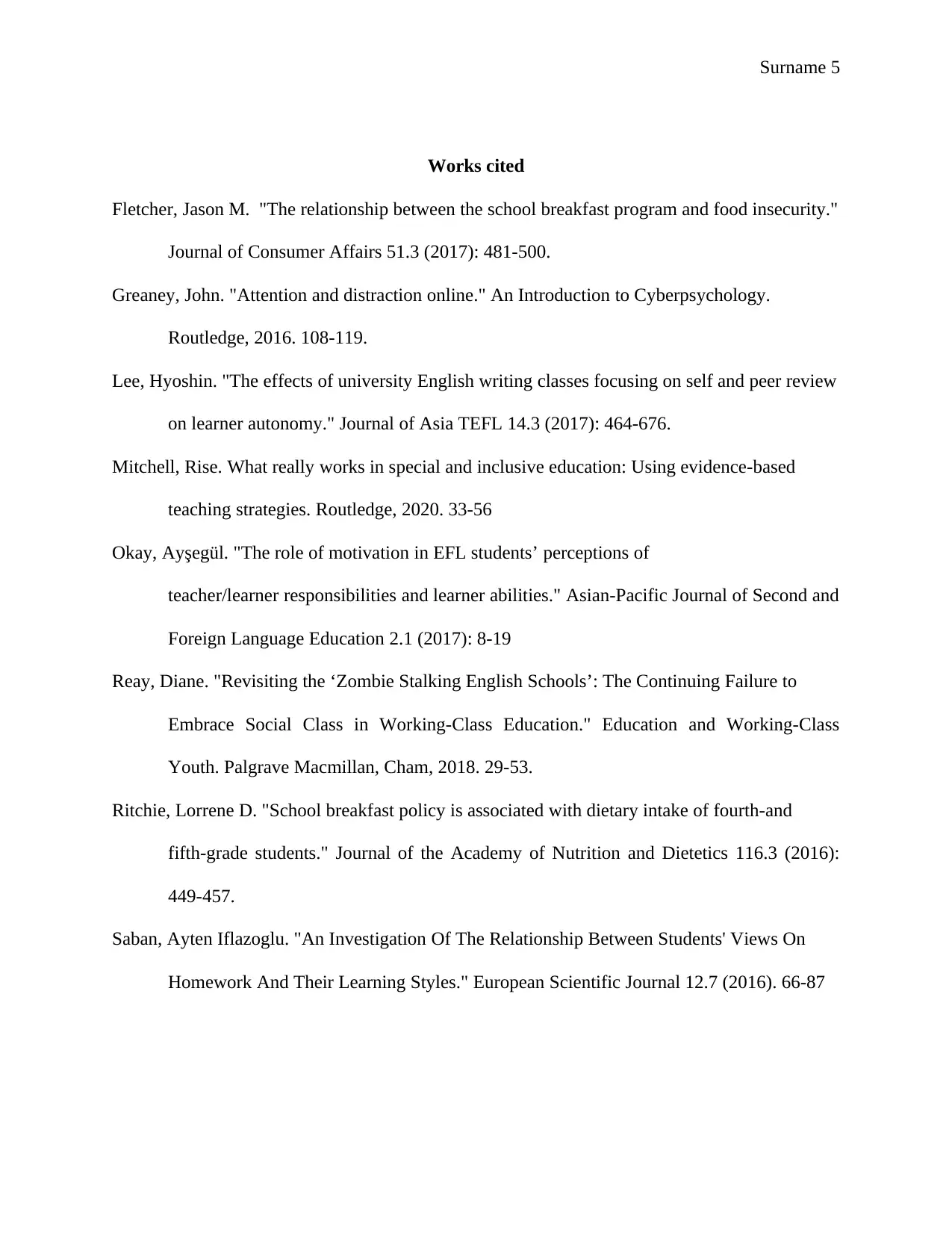
Surname 5
Works cited
Fletcher, Jason M. "The relationship between the school breakfast program and food insecurity."
Journal of Consumer Affairs 51.3 (2017): 481-500.
Greaney, John. "Attention and distraction online." An Introduction to Cyberpsychology.
Routledge, 2016. 108-119.
Lee, Hyoshin. "The effects of university English writing classes focusing on self and peer review
on learner autonomy." Journal of Asia TEFL 14.3 (2017): 464-676.
Mitchell, Rise. What really works in special and inclusive education: Using evidence-based
teaching strategies. Routledge, 2020. 33-56
Okay, Ayşegül. "The role of motivation in EFL students’ perceptions of
teacher/learner responsibilities and learner abilities." Asian-Pacific Journal of Second and
Foreign Language Education 2.1 (2017): 8-19
Reay, Diane. "Revisiting the ‘Zombie Stalking English Schools’: The Continuing Failure to
Embrace Social Class in Working-Class Education." Education and Working-Class
Youth. Palgrave Macmillan, Cham, 2018. 29-53.
Ritchie, Lorrene D. "School breakfast policy is associated with dietary intake of fourth-and
fifth-grade students." Journal of the Academy of Nutrition and Dietetics 116.3 (2016):
449-457.
Saban, Ayten Iflazoglu. "An Investigation Of The Relationship Between Students' Views On
Homework And Their Learning Styles." European Scientific Journal 12.7 (2016). 66-87
Works cited
Fletcher, Jason M. "The relationship between the school breakfast program and food insecurity."
Journal of Consumer Affairs 51.3 (2017): 481-500.
Greaney, John. "Attention and distraction online." An Introduction to Cyberpsychology.
Routledge, 2016. 108-119.
Lee, Hyoshin. "The effects of university English writing classes focusing on self and peer review
on learner autonomy." Journal of Asia TEFL 14.3 (2017): 464-676.
Mitchell, Rise. What really works in special and inclusive education: Using evidence-based
teaching strategies. Routledge, 2020. 33-56
Okay, Ayşegül. "The role of motivation in EFL students’ perceptions of
teacher/learner responsibilities and learner abilities." Asian-Pacific Journal of Second and
Foreign Language Education 2.1 (2017): 8-19
Reay, Diane. "Revisiting the ‘Zombie Stalking English Schools’: The Continuing Failure to
Embrace Social Class in Working-Class Education." Education and Working-Class
Youth. Palgrave Macmillan, Cham, 2018. 29-53.
Ritchie, Lorrene D. "School breakfast policy is associated with dietary intake of fourth-and
fifth-grade students." Journal of the Academy of Nutrition and Dietetics 116.3 (2016):
449-457.
Saban, Ayten Iflazoglu. "An Investigation Of The Relationship Between Students' Views On
Homework And Their Learning Styles." European Scientific Journal 12.7 (2016). 66-87
1 out of 5
Related Documents
Your All-in-One AI-Powered Toolkit for Academic Success.
+13062052269
info@desklib.com
Available 24*7 on WhatsApp / Email
![[object Object]](/_next/static/media/star-bottom.7253800d.svg)
Unlock your academic potential
Copyright © 2020–2026 A2Z Services. All Rights Reserved. Developed and managed by ZUCOL.





